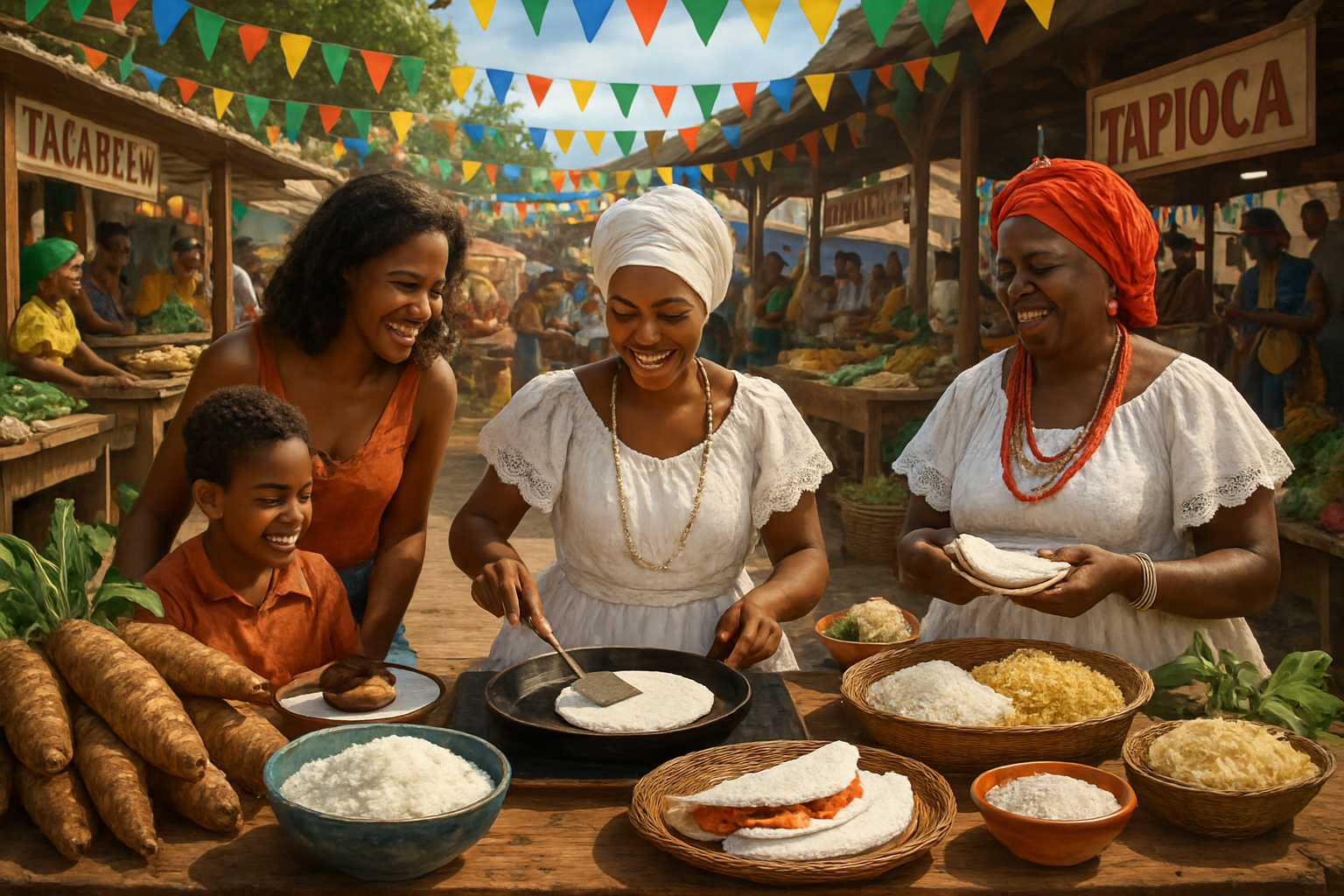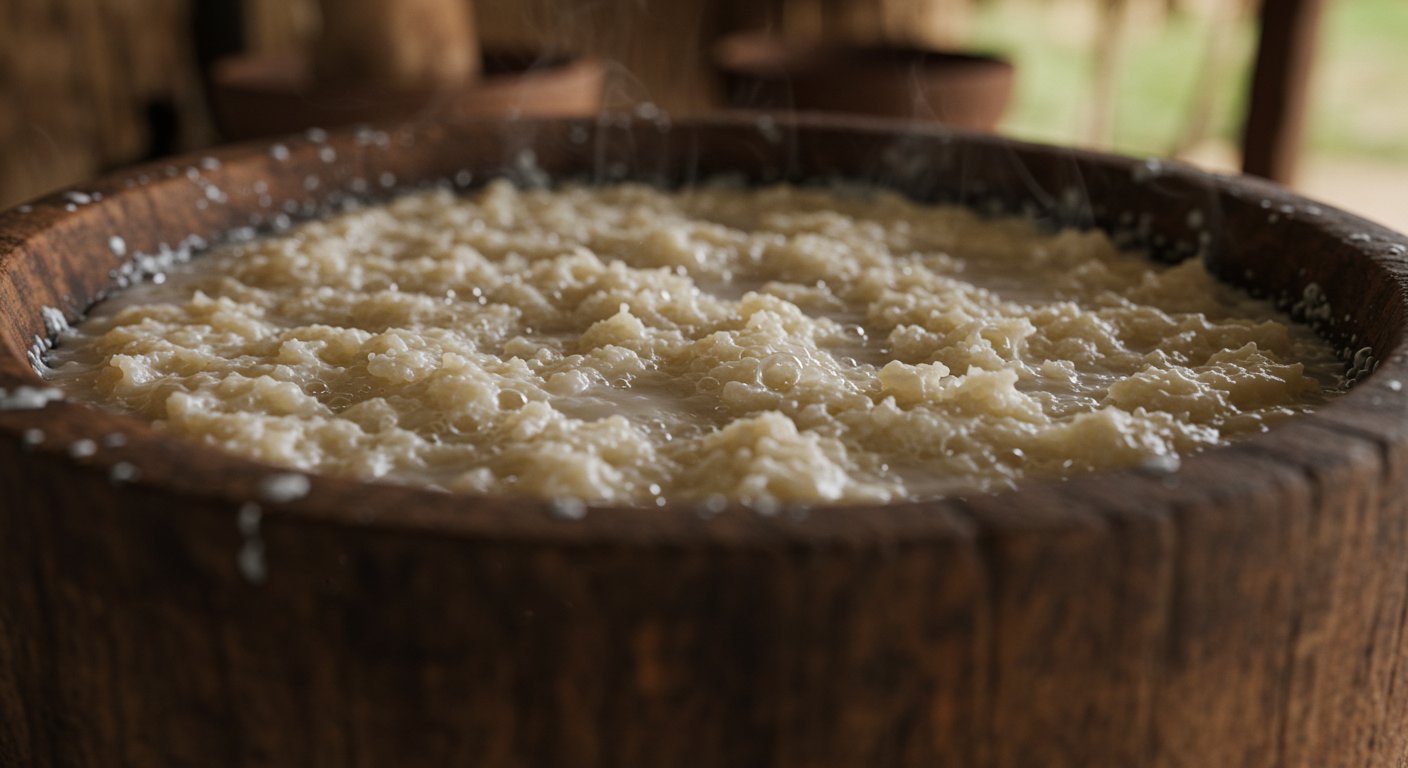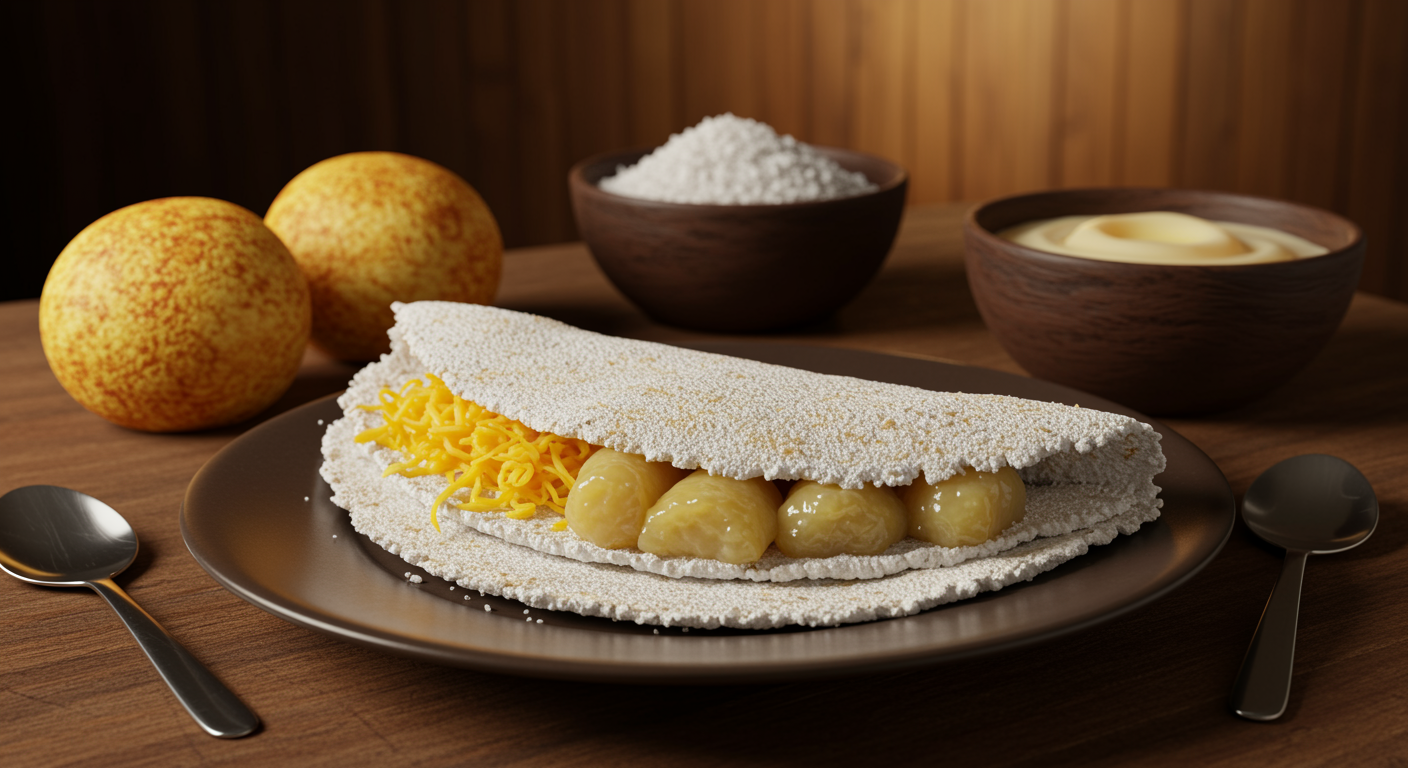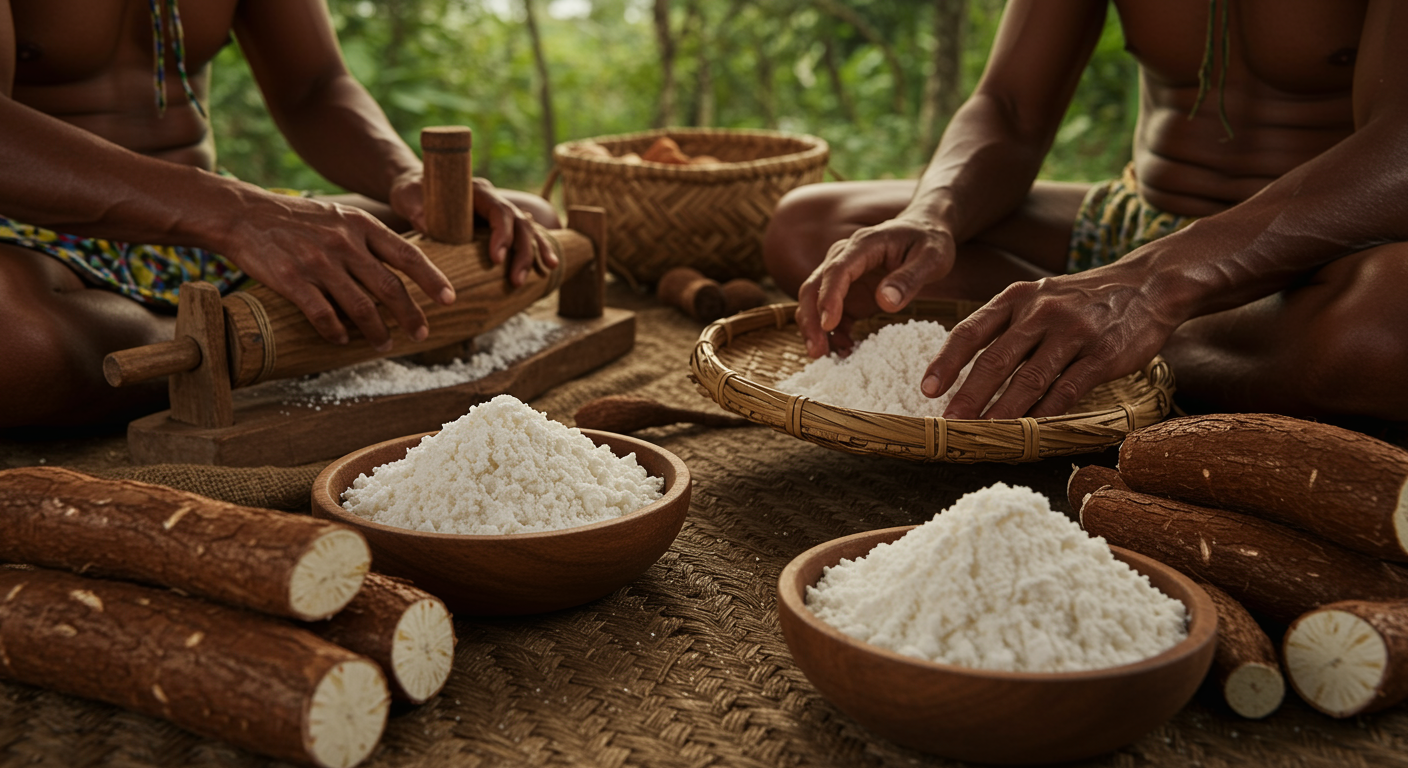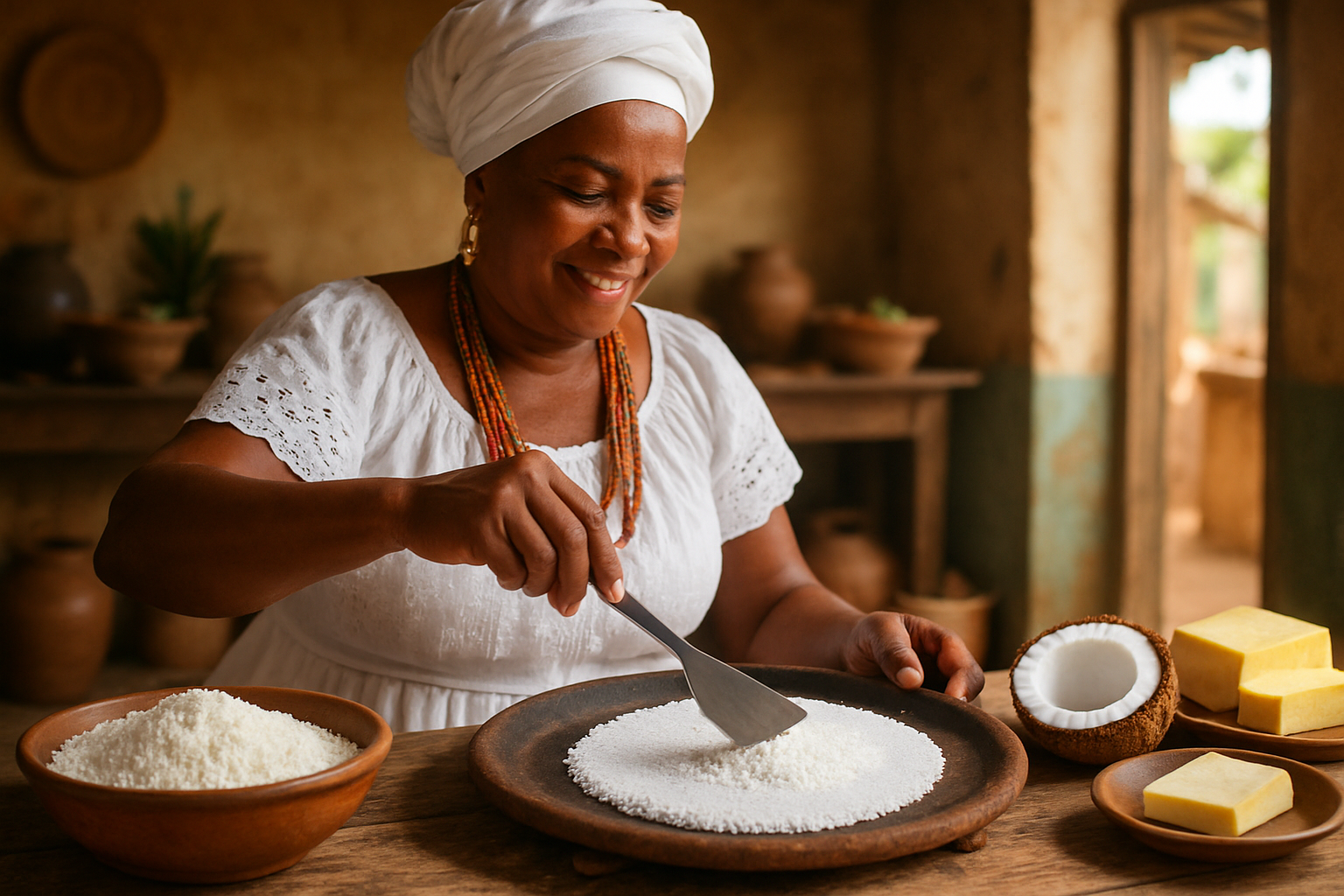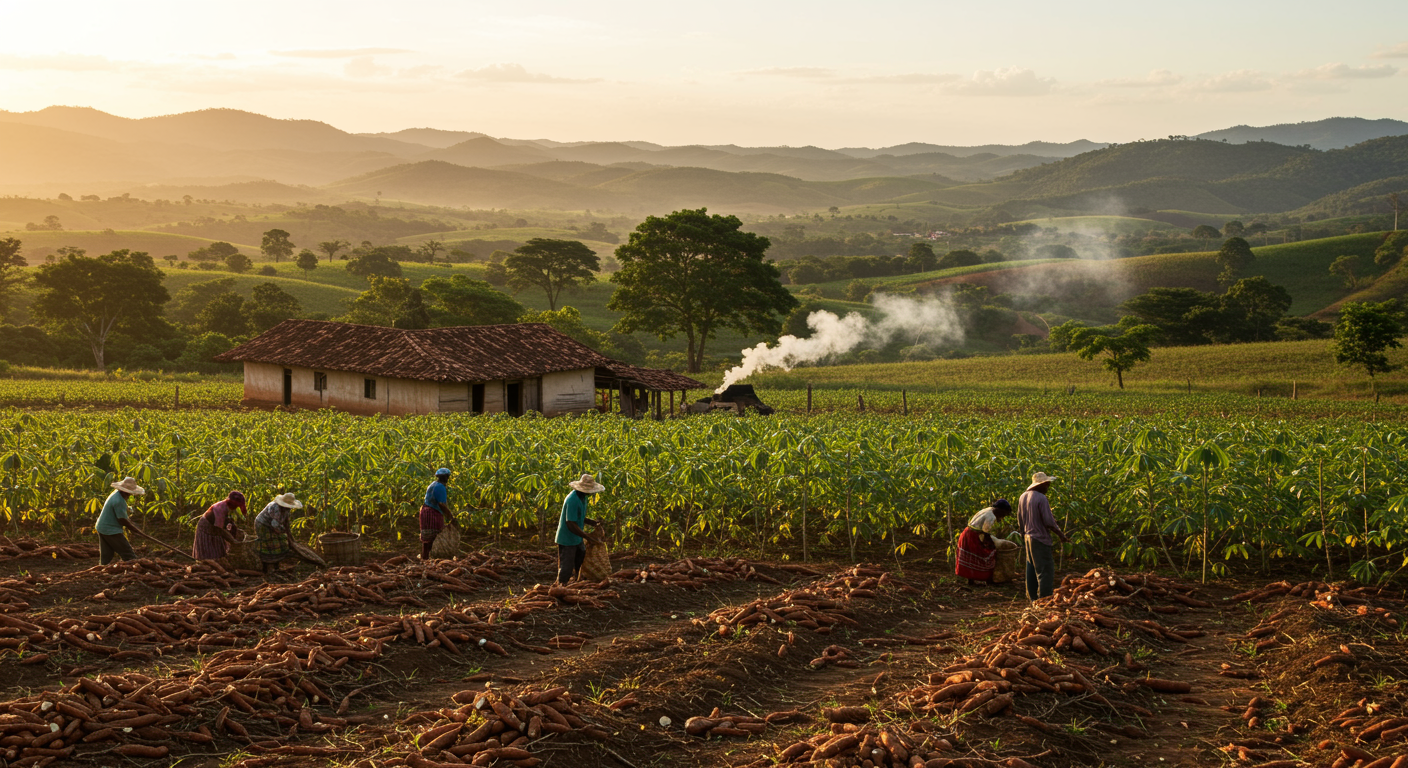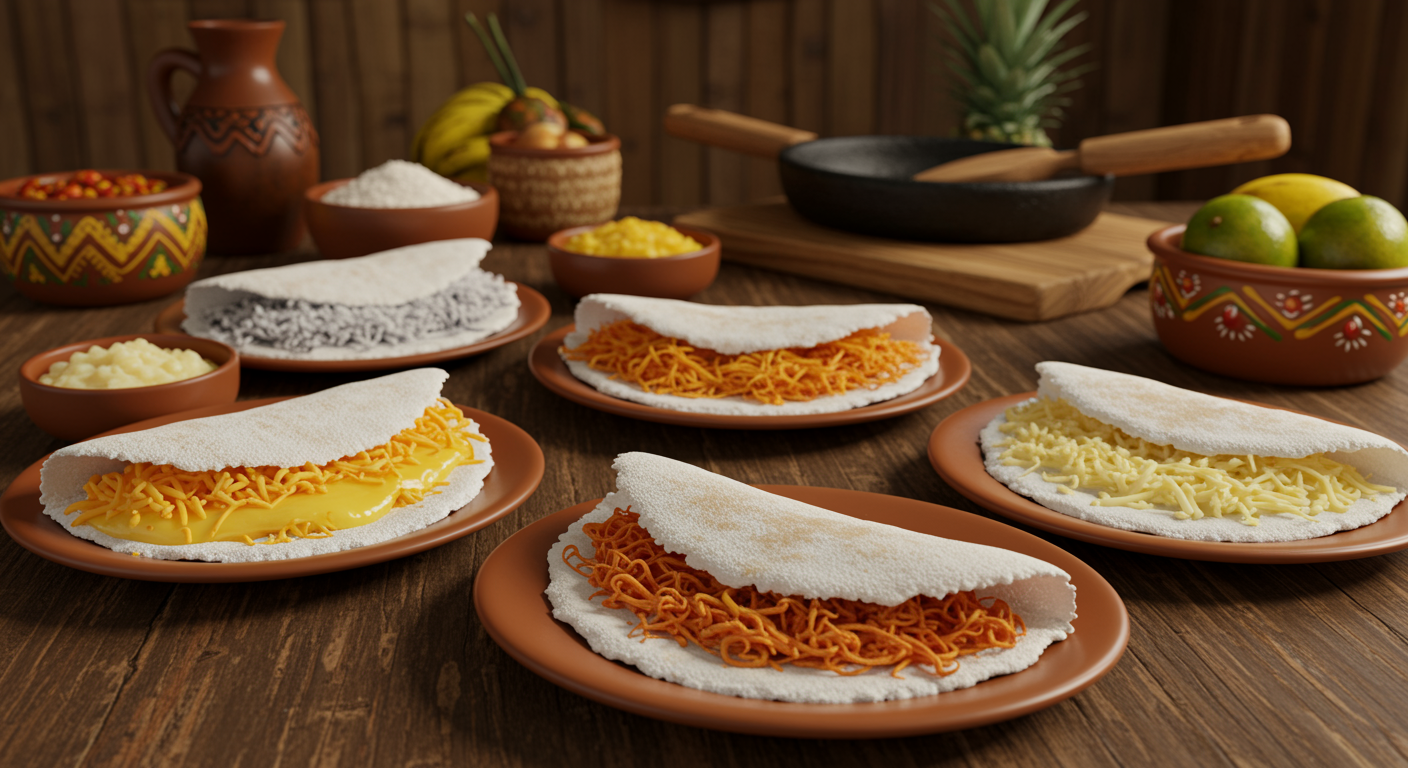Tapioca, a truly humble yet remarkably versatile food derived from the resilient cassava plant, intricately weaves itself into the very fabric of Bahian life. It profoundly transcends its traditional role as a simple daily meal to become an potent symbol of celebration, deep-seated community, and enduring tradition. In the vibrant and culturally rich interior of Bahia, tapioca is not merely consumed; it is enthusiastically celebrated in a captivating kaleidoscope of festivals, intimate gatherings, and time-honored rituals that unequivocally showcase its profound cultural significance. This comprehensive and insightful exploration into tapioca’s pivotal role in Bahian festivities reveals, with stunning clarity, how this unassuming starch powerfully connects people to their cherished heritage, their beloved land, and, most importantly, to each other. This intricate connection solidifies tapioca’s irreplaceable place as an integral and cherished element of the region’s distinct cultural identity.
Sacred and Secular Gatherings: Tapioca as a Unifying Communal Offering
Within the diverse and spiritual landscape of the Bahian interior, tapioca frequently occupies a prominent position in both solemn religious festivals and effervescent secular gatherings. In these contexts, it acts as a crucial culinary anchor that actively fosters and reinforces community cohesion. During significant religious events, such as the revered patron saint festivals (festas de padroeiro) or the deeply spiritual Catholic pilgrimages (romarias), various tapioca preparations are frequently and generously shared among devoted participants. This act of sharing food profoundly symbolizes communal solidarity, mutual support, and heartfelt gratitude. These shared meals serve a dual purpose: they vigorously reinforce social bonds among congregants and provide essential nourishment during the often long and demanding days of devotion and celebration. The careful act of preparing and, subsequently, distributing tapioca in these sacred contexts is often deeply imbued with profound spiritual meaning, representing heartfelt offerings or the sharing of blessings received.
Parallel to these religious events, lively secular celebrations, such as joyous harvest festivals or exuberant local street parties (festas de largo), also powerfully underscore tapioca’s essential communal aspect. Here, large, communal batches of tapioca are frequently prepared through collective effort, with multiple family members, extended relatives, and close neighbors enthusiastically contributing their labor and expertise to the endeavor. This collective effort transcends mere culinary production; it actively transforms the entire preparation process into a vibrant social event. Such participation significantly strengthens intergenerational ties, as elders impart ancestral knowledge and techniques to younger generations, thereby ensuring the preservation of invaluable traditional culinary heritage through shared, hands-on experience. The joyous consumption of tapioca in these dynamic settings is almost invariably accompanied by rhythmic music, spirited dancing, and captivating storytelling sessions, all of which collectively create an atmosphere of vibrant and enriching cultural exchange and profound unity.
The Integral Role of Casas de Farinha in Festival Preparations
Absolutely central to many of these large-scale communal tapioca preparations are the revered casas de farinha (flour houses). These traditional, often rustic, processing centers are where the raw harvested cassava is meticulously transformed into various forms of flour and the essential goma (hydrated starch). In the lead-up to major festivals and celebrations, these community hubs become hives of intense activity, bustling with energy as families from across the region bring their freshly harvested cassava to be processed. The collective labor involved in this intricate process—from the initial grating of the tough roots to the meticulous pressing, sifting, and drying of the starch—is, in itself, a significant social event. These moments are filled with animated conversations, infectious laughter, and the invaluable sharing of ancestral techniques and family recipes. The resulting, freshly processed tapioca flour and goma are then strategically utilized to prepare a wide array of dishes for the impending celebrations, thereby directly and powerfully linking the fundamental agricultural cycle of the region to its cherished festive traditions. This symbiotic relationship between cultivation, processing, and celebration underscores the holistic nature of tapioca’s cultural integration.
Festivals of Mandioca: A Celebration of the Root and its Legacy
Beyond its mere presence at various celebrations, tapioca and its parent plant, mandioca, are often the very subject and focal point of dedicated festivals in the Bahian interior. These “Festivals of Mandioca” or, more broadly, “Festas da Farinha” are profound and deeply symbolic celebrations of agricultural labor, the abundance of local produce, and the critical economic backbone that these vital crops provide to countless rural communities. These significant cultural events typically occur immediately following the intensive cassava harvest, bringing together hardworking farmers, skilled processors, and eager consumers in a vibrant and dynamic display of local culture and communal pride.
These mandioca-centric festivals are distinguished by several key characteristics:
- Engaging Demonstrations of Traditional Processing: Attendees, often including tourists and local youth, have the unique opportunity to observe, and sometimes even actively participate in, the intricate traditional methods of cassava processing. This ranges from the initial arduous grating to the precise pressing and careful sifting of the starch, thereby gaining a deeper, hands-on appreciation for the considerable labor, skill, and ancestral knowledge involved in transforming the raw tuber into its edible forms. These demonstrations enhance the E-E-A-T of the local knowledge keepers.
- Exciting Culinary Competitions: A highlight of these festivals, local cooks and culinary artisans enthusiastically compete, showcasing both innovative and deeply traditional tapioca dishes. The array spans from the most basic, perfectly cooked beijus to incredibly complex and artfully crafted tapioca-based desserts, all of which brilliantly highlight the ingredient’s extraordinary versatility and gastronomic potential. These competitions often foster friendly rivalry and push culinary boundaries while celebrating heritage.
- Captivating Cultural Performances: The festive atmosphere is invariably enriched by enthralling folkloric music, energetic traditional dance, and captivating storytelling sessions. These performances vividly narrate the long and storied history and the profound cultural significance of mandioca and tapioca, transmitting knowledge and values through the powerful medium of artistic expression. They connect generations to their shared past.
- Bustling Local Marketplaces: An essential component of these festivals, vibrant marketplaces feature dedicated stalls where farmers and skilled artisans proudly sell their freshly processed cassava flour, high-quality goma, and a diverse variety of tapioca-based products. This direct-to-consumer model robustly supports the local economy, ensures fair pricing for producers, and actively promotes sustainable agricultural and artisanal practices. These markets are demonstrably critical for the ROI and long-term sustainability of local producers.
The Symbolic Power of the Mandioca Harvest
The successful harvest of mandioca, which is meticulously celebrated in these dedicated festivals, carries immense symbolic weight, representing profound resilience, abundant sustenance, and enduring hope. Particularly in regions of Bahia prone to recurring droughts and environmental challenges, a bountiful cassava harvest is not merely a cause for celebration; it is a profound testament to survival and guarantees vital food security for the entire community for the months ahead. Tapioca, in all its forms, born directly from this precious harvest, becomes a tangible and powerful representation of survival against adversity, continuous sustenance, and the unwavering, almost sacred, connection between the Bahian people and their often challenging, yet ultimately fertile, land. These heartfelt celebrations instill an immense sense of pride in local agricultural practices and vigorously reinforce the irreplaceable importance of traditional knowledge for safeguarding the well-being of future generations. This reinforces community bonds and ensures the transfer of expertise.
Tapioca as a Culinary Star in Bahian Gastronomic Events and Food Tourism
Tapioca’s burgeoning prominence extends far beyond local festivals to encompass broader gastronomic events and prestigious food fairs held across the entire state of Bahia, where it frequently commands a central and celebrated position. These sophisticated culinary events, meticulously designed to showcase the unparalleled richness and diversity of Bahian cuisine, invariably feature dedicated stalls or even entire sections exclusively devoted to tapioca. This strategic emphasis brilliantly celebrates its extraordinary versatility, broad appeal, and its deep cultural roots. Talented chefs, ranging from revered traditional masters to innovative contemporary culinary artists, often present breathtakingly creative interpretations of tapioca dishes, skillfully blending age-old, time-honored recipes with cutting-edge modern culinary techniques and presentations.
These significant gastronomic events serve a multitude of vital purposes:
- Empowering Local Producers and Promoting Fair Trade: They provide an absolutely crucial and invaluable platform for small-scale tapioca producers and artisans from the interior of Bahia to effectively reach much wider, more diverse urban and tourist audiences. This directly facilitates increased sales, fosters invaluable networking opportunities, and supports fair trade practices, thereby strengthening the economic sustainability of rural communities.
- Enlightening the Public Through Culinary Education: Visitors, often eager and curious, gain invaluable knowledge about the various distinct types of tapioca, the nuanced intricacies of its preparation, and its rich cultural background. This educational component significantly deepens their appreciation and understanding of this versatile staple, connecting them to its heritage.
- Fostering Culinary Innovation and Creativity: The exposure to a diverse array of culinary talents and gastronomic philosophies at these events actively encourages the development of novel and imaginative uses for tapioca. This pushes the traditional boundaries of recipes while always respectfully honoring their deep historical roots and cultural significance.
- Driving Sustainable Tourism and Economic Growth: These high-profile events powerfully attract culinary tourists from both national and international origins, generating significant revenue for local businesses and communities. They also cultivate broader interest in the unique cultural and gastronomic heritage of Bahia, thereby contributing substantially to the broader regional economy and fostering sustainable tourism development.
Intergenerational Knowledge Transfer: A Living Legacy
Within the vibrant and dynamic environments of these festive and gastronomic gatherings, the intricate art of making tapioca is not only vividly demonstrated but also actively and organically transferred across generations. It is a common and heartwarming sight to witness grandmothers, with decades of experience, meticulously preparing traditional beijus alongside their eager grandchildren. In these moments, they are sharing not just the precise techniques and subtle nuances of the preparation, but also the invaluable stories, cherished memories, and deeply held values inextricably associated with this beloved food. This informal, hands-on apprenticeship is absolutely vital for the preservation of traditional foodways and ensures, with unwavering certainty, that the essential skills and profound cultural significance of tapioca continue to endure and thrive for many generations to come. This robust process represents a living, breathing manifestation of E-E-A-T, where invaluable experience and specialized expertise are directly and authentically passed on, strengthening the foundation of cultural authority.
Religious Festivals and Bahia’s Rich Syncretic Traditions
Bahia is universally renowned for its exceptionally rich and complex religious syncretism, a unique cultural phenomenon where deeply entrenched Catholic traditions are intricately intertwined with powerful African-derived spiritual practices, particularly Candomblé and Umbanda. Tapioca, given its status as a versatile, culturally embedded, and historically significant food, also finds its unique and respected place within this intricate spiritual landscape. During significant celebrations for revered figures such as Iemanjá (who is venerated in both Candomblé and Umbanda, and often syncretized with Our Lady of the Immaculate Conception in Catholicism), tapioca-based offerings are frequently and reverently prepared. These offerings, often simple and pure in their composition, reflect profound humility and deep respect, symbolizing a powerful connection to the fertile earth, the nurturing waters, and the ancestral spirits.
Similarly, during the festive feasts dedicated to various Catholic saints who have their powerful and venerated counterparts in Afro-Brazilian religions (for instance, Saint George and Ogum), tapioca might be a crucial component of the communal shared meal or an essential ingredient in specific ceremonial dishes. Its inherent neutrality and pure composition allow it to be seamlessly adapted to various ritualistic requirements and sacred contexts, underscoring its deep and pervasive integration into the spiritual and religious life of the Bahian people. The purity of the tapioca starch itself can often symbolize cleansing, renewal, or new beginnings, making it particularly suitable for inclusion in sacred and ritualistic preparations. This adaptability speaks to its profound cultural resonance.
Feasting and Fasting: Tapioca’s Dual Spiritual Role
In some specific religious traditions practiced in Bahia, tapioca demonstrates a remarkable dual functionality: it can serve both as a nourishing food for communal feasting during times of celebration and as a humble, yet sustaining, form of sustenance during periods of fasting, penance, or spiritual introspection. Its simple and natural composition makes it highly suitable for diets that emphasize purity, austerity, or abstinence, allowing practitioners to focus on spiritual rather than material consumption. Conversely, its inherent versatility allows it to be richly enhanced and elaborately prepared for joyous celebratory meals. This unique dual functionality further highlights tapioca’s deep cultural adaptability and its profound, almost sacred, connection to the spiritual rhythms and life cycles of Bahian society. This broad application enhances its E-E-A-T.
Table 2: Tapioca’s Multifaceted Role in Key Bahian Celebrations and Rituals
| Celebration Type | Key Characteristics | Tapioca’s Significance | Example Tapioca Use & Cultural Context |
|---|---|---|---|
| Religious Festivals | Patron saint feasts, pilgrimages, Afro-Brazilian rites. | Communal sharing, sacred offerings, spiritual communion, humility. | Shared beijus, simple starch offerings to deities, ceremonial meals. |
| Mandioca Festivals | Harvest celebrations, agricultural fairs, local produce showcases. | Celebration of agricultural labor, economic backbone, cultural pride, ancestral knowledge. | Culinary competitions, artisan sales, live processing demonstrations. |
| Secular Gatherings | Street parties (festas de largo), family reunions, neighborhood events. | Social cohesion, intergenerational knowledge transfer, shared joy, community building. | Collective preparation (e.g., large batches for parties), shared family meals. |
| Gastronomic Events | Food fairs, culinary showcases, regional food festivals. | Promotion of local produce, culinary innovation, economic development via tourism. | Gourmet tapioca dishes, live cooking demonstrations by chefs, tasting sessions. |
| Everyday Rituals | Daily breakfast, afternoon snacks, informal family moments. | Source of comfort, familiarity, cultural continuity, routine sustenance. | Simple tapioca with butter/cheese, prepared by family members. |
Tapioca in Everyday Rituals and Intimate Family Gatherings: The Heart of Home
Beyond the grandeur and excitement of large-scale festivals, tapioca also profoundly solidifies its cultural importance through the quiet rhythms of everyday rituals and the warmth of intimate family gatherings in the interior of Bahia. The simple act of making tapioca for breakfast, for instance, is often a deeply cherished family tradition, lovingly passed down from parents to eager children, and from grandparents to grandchildren. It transcends a mere meal preparation; it becomes a precious moment of togetherness, a quiet and comforting celebration of continuity, and a potent symbol of home-cooked comfort. The distinctive, inviting aroma of tapioca cooking on the hot griddle wafting through a Bahian home often evokes powerful feelings of nostalgia, cherished memories, and a profound sense of belonging.
These small, yet incredibly significant, recurring rituals play a vital role in reinforcing tapioca’s immutable position as a consistent source of comfort, unwavering familiarity, and deep-seated cultural pride. It is precisely during these informal, everyday moments that younger generations learn not only the practical, hands-on skills of expertly preparing tapioca, but also, crucially, absorb the countless stories, fundamental values, and enduring traditions inextricably associated with it. This continuous, informal, and deeply personal transmission of knowledge is absolutely vital for the sustained preservation of Bahian culinary heritage, ensuring, with unwavering certainty, that tapioca’s cherished place in the hearts, homes, and collective memory of the people remains secure and vibrant for generations to come. It’s a key element of sustainable cultural E-E-A-T.
The Power of Oral Tradition and Collective Memory
Oral tradition plays an exceptionally significant role in the robust transmission of the intricate history, diverse preparation methods, and nuanced cultural contexts of tapioca. Recipes, often not formally written down, are instead shared verbally, accompanied by a rich tapestry of personal anecdotes about memorable family gatherings, historical community events, and unique local customs. This powerful and deeply personal storytelling imbues tapioca with a rich, vibrant narrative, organically connecting each dish and each preparation to a living, evolving cultural lineage. This active engagement with collective memory and shared narratives is a key aspect of how experience, expertise, and trustworthiness are organically built and maintained around this iconic food. It reinforces the authenticity and authority of the culinary heritage.
Modern Interpretations, Preservation Challenges, and Economic Opportunities
As the interior of Bahia gracefully navigates the complexities and opportunities of modernity, tapioca finds itself at a fascinating crossroads, facing both new challenges and exciting prospects. While traditional preparation methods and ancestral knowledge continue to endure and thrive, there has also been a discernible and rising trend of modern culinary interpretations, the emergence of sophisticated gourmet tapiocarias in bustling urban centers, and the strategic marketing of tapioca as a healthy, naturally gluten-free dietary option. These contemporary developments collectively introduce tapioca to significantly wider and more diverse audiences and integrate it into new and innovative economic models, thereby substantially contributing to its commercial scalability and diversified monetization potential.
However, a critical challenge lies in carefully balancing this wave of innovation with the imperative of preservation. It is absolutely crucial to ensure that the fundamental essence of traditional tapioca—its deep connection to indigenous roots, its historical communal practices, and its indelible regional identity—is not diluted or compromised in the pursuit of modernization and broader market appeal. Initiatives that actively support fair pricing mechanisms for small-scale local producers, tirelessly promote sustainable cassava cultivation practices that respect the environment, and meticulously document traditional knowledge are all absolutely essential for safeguarding this invaluable culinary heritage. Festivals and celebratory events continue to be vital platforms for achieving this delicate yet crucial balance, acting as powerful anchors for tradition while simultaneously allowing ample space for creative culinary expression and innovation.
Culinary Tourism, Economic Empowerment, and Global Reach
The rapidly growing global interest in authentic culinary tourism, particularly in regions like Bahia’s interior, presents a significant and promising economic opportunity. Visitors, often eager to experience genuine Bahian culture firsthand, are increasingly drawn to interactive tapioca workshops, insightful visits to traditional casas de farinha, and vibrant local food festivals. This surge in interest not only generates direct and much-needed revenue for local communities but also profoundly elevates the cultural and gastronomic profile of tapioca, reinforcing its immense cultural and economic value on a broader scale. Strategic investment in such well-planned culinary tourism initiatives can significantly boost the ROI for local producers, foster sustainable economic growth, and position tapioca as a globally recognized culinary treasure, further solidifying its presence in diverse markets.
Checklist: Tapioca’s Enduring Festive & Traditional Presence and Future Outlook
- Communal Preparation: A fundamental cornerstone of shared meals and robust social bonding.
- Harvest Celebrations: Dedicated festivals honoring cassava, agricultural labor, and ancestral wisdom.
- Culinary Showcase: Central to gastronomic events, highlighting its incredible versatility and adaptability.
- Religious Significance: Deeply integrated into syncretic spiritual practices and sacred offerings.
- Family Rituals: Daily preparation reinforcing intergenerational ties, comfort, and cultural continuity.
- Economic Support: Sustains local producers and strengthens rural economies through vibrant markets.
- Cultural Identity: A powerful, living symbol of Bahian heritage, resilience, and cultural adaptation.
- Modern Adaptation & Preservation: Evolving with new trends while diligently preserving core traditions.
- Global Potential: Strategic positioning for culinary tourism and international market appeal.
By deeply understanding tapioca’s intricate roots in Bahian celebrations and traditions, we gain a much richer appreciation for its multifaceted role—as an indispensable source of sustenance, a powerful catalyst for community building, a vital economic driver, and an enduring, potent emblem of profound cultural identity. This intricate historical, social, and cultural context truly enriches every single bite, offering an authentic taste of Bahia’s soul and its enduring legacy.

